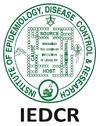
CHAMPS Bangladesh
About Our Work
CHAMPS Bangladesh joined the Network in 2016 and completed its first MITS in 2017. The program operates in two districts of central Bangladesh: Rajbari (Baliakandi) and Faridpur. These areas represent CHAMPS’ only fully rural catchment site in South Asia, providing a uniquely important view into mortality patterns in a region that accounts for 34% of the world’s neonatal deaths. Surveillance activities are anchored in Baliakandi’s HDSS and local health facilities, with laboratory work supported by icddr,b. CHAMPS Bangladesh collaborates closely with the Institute of Epidemiology, Disease Control, and Research (IEDCR), Bangladesh’s national public health institute, and with district and sub-district health authorities to enhance data utilization and strengthen health system responses.
Our Impact
In Bangladesh, CHAMPS positively impacts over 216,000 lives in the Baliakandi sub-district. By collaborating with partners to address high child mortality rates through data-driven strategies and innovative community interventions, we are saving children’s lives in the region.

0
Population Under Surveillance

0 /1000
Under 5 Mortality Rate

0 /1000
Infant Mortality Rate

0 /1000
Neonatal Mortality Rate

0 /1000
Stillbirth Rate
Data updated: 2021
FILTER BY:

Meet our Directors

Shams El Arifeen is the first Senior Director of the Maternal and Child Health Division (MCHD) at icddr,b in Bangladesh. Dr. Arifeen is also a Professor at the James P. Grant School of Public Health at the BRAC University in Bangladesh, where he teaches epidemiology. His interests are in maternal, newborn and child health, nutrition and development, where he has worked for over 30 years. His work has focused on monitoring and evaluation of community and facility-based interventions addressing common causes of maternal and child illness and death, as well as implementation research to improve delivery of health services. He actively participates in national efforts within Bangladesh to scale up evidence-based interventions. Dr. Arifeen serves on a number of Bangladesh’s technical and advisory committees as well as on global task/working groups.
He is trained in medicine, public health, nutrition, and epidemiology, and holds a Bachelor of Medicine and Bachelor of Surgery (MBBS) degree from Dhaka Medical College and a Master of Public Health and Doctorate in Public Health from Johns Hopkins University. He has published over 260 scientific papers in peer-reviewed journals.

Dr. Emily Gurley is an Associate Scientist in the Department of Epidemiology at the Johns Hopkins Bloomberg School of Public Health. She has worked in public health research in Bangladesh since 2003, and she spent 12 years at the icddr,b (International Center for Diarrheal Diseases Research, Bangladesh) where she led the Surveillance and Outbreak Investigation Unit, and served as Director of the Program on Emerging Infections. She worked closely with the U.S. Centers for Disease Control and Prevention (CDC) and the Government of Bangladesh to establish national surveillance for meningoencephalitis, respiratory infections, acute gastroenteritis, acute hepatitis, and hospital-acquired infections, with a focus on developing junior scientists. Dr. Gurley earned her Master of Public Health from Emory University in 2002 and a Ph.D. in Epidemiology from Johns Hopkins University in 2012.
Dr. Gurley leads multidisciplinary studies on the transmission, burden, and epidemiology of a variety of emerging and vaccine-preventable diseases, taking into account the ecological context in which human disease occurs. Her interests include improving the communication and collaboration between field epidemiologists and infectious disease modelers, and the development of novel surveillance and outbreak detection strategies. She began research to develop strategies for the use of post-mortem tissue sampling as a surveillance tool in Bangladesh in 2008.
Dr. Gurley has published more than 110 peer-reviewed papers and has served on World Health Organization (WHO) committees to draft recommendations about the use of Hepatitis E vaccines and measurement of dengue infection. She currently serves on WHO’s taskforce for research and development of medical countermeasures against Nipah virus.
Key Partners
CHAMPS Working in Bangladesh to Save Lives
Discover the stories of hope and change as CHAMPS works tirelessly saving children’s lives in Bangladesh.





